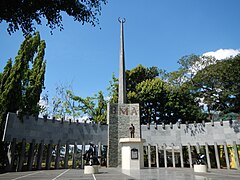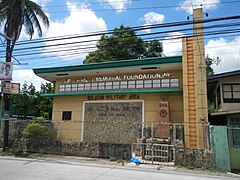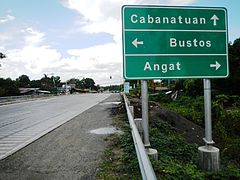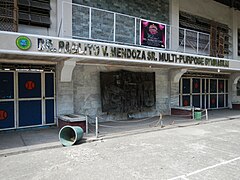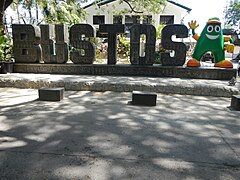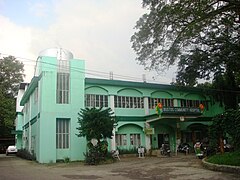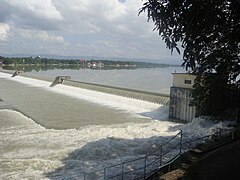Bustos, Bulacan: Difference between revisions
Tags: Mobile edit Mobile web edit |
|||
| Line 120: | Line 120: | ||
*St. Peter the Apostle Chapel - located in Brgy. San Pedro |
*St. Peter the Apostle Chapel - located in Brgy. San Pedro |
||
*Our Lady of Perpetual Help Chapel - located in Pitong Gatang, Brgy. Poblacion |
*Our Lady of Perpetual Help Chapel - located in Pitong Gatang, Brgy. Poblacion |
||
*San Roque de Catacte Chapel- located in Brgy. Catacte |
*San Roque de Catacte Chapel - located in Brgy. Catacte |
||
Other religious groups: |
Other religious groups: |
||
*[[Iglesia Ni Cristo]] - locale of Brgy. Bonga |
*[[Iglesia Ni Cristo]] - locale of Brgy. Bonga Mayor, District of Bulacan North |
||
*Bustos [[Seventh-day Adventist Church]] - located in Brgy. Bonga Menor |
*Bustos [[Seventh-day Adventist Church]] - located in Brgy. Bonga Menor |
||
*[[Jesus is Lord Church]] (Bustos Chapter) - located in Brgy. San Pedro |
*[[Jesus is Lord Church]] (Bustos Chapter) - located in Brgy. San Pedro |
||
Revision as of 07:59, 5 January 2017
Bustos | |
|---|---|
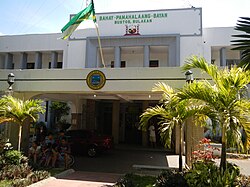 Municipal hall | |
 Map of Bulacan showing the location of Bustos | |
| Country | Philippines |
| Region | Central Luzon |
| Province | Bulacan |
| District | 2nd District |
| Founded | April 26, 1867 |
| Barangays | 14 |
| Government | |
| • Mayor | Arnel F. Mendoza (NUP) |
| Area | |
• Total | 69.99 km2 (27.02 sq mi) |
| Population (2020 census)[3] | |
• Total | 77,199 |
| • Density | 1,100/km2 (2,900/sq mi) |
| • Poverty rate | |
| Demonym | Bustosenyo |
| Time zone | UTC+8 (PST) |
| ZIP code | 3007 |
| IDD : area code | +63 (0)44 |
| Income class | 2nd Class |
| Electricity | Manila Electric Company |
| • Consumption | 19.66 million kWh (2003) |
Bustos is a second class municipality in the province of Bulacan, Philippines. According to the 2020 census, it has a population of 77,199 people.[3]
With the continuous expansion of Metro Manila, Bustos is now included in the Greater Manila's built-up conurbation area which reaches San Ildefonso, Bulacan at its northernmost part.
History
Bustos was a part of the town of Baliuag as its barrio during the Spanish Period. The town was separated from Baliuag by a tragic incident when around 1860, a rainy Sunday, a group of natives from Bustos with babies in their arms were on their way to St. Augustine Parish Church of Baliuag for baptismal when they drowned when the raft or planceta they were riding capsized while crossing the wild river of Angat due to the strong water current. This fateful event led the people of Bustos to request and build their own parish church to be able to avoid crossing the wild river for community safety. The people chose Holy Child Jesus (Sto. Niño) as their patron saint in honor of those infants that died in the river.
Bustos also gained its independence from Baliuag in April 29, 1867 through the painstaking efforts and sacrifices of its inhabitants with the integration of barrios Bonga Mayor and Bonga Menor. The town got its name from Don Jose Pedro de Busto[s], a mining engineer from Asturias, Spain, and right-hand of Simon de Anda y Salazar who was appointed tenyente heneral alkalde of Bulacan and an aide of a Spanish Governor General of the Philippines during the late 1700s. But the town became a part of Baliuag again during the American period. Bustos became also a part of the historical World War II in the Philippines and it served as the headquarters of soldiers in the province of Bulacan during the war in 1945.
Bustos was again separated from Baliuag and became a distinct municipality on January 1, 1916 during the Philippine Assembly through 4th Philippine Legislature Assemblyman Ricardo Lloret Gonzalez. After a year when the town became a distinct municipality, the town inaugurated its Municipal Hall on January 1, 1917. Leon Prado became its first local leader and served from 1917 to 1919. Padre Gabriel Alvarez served as the first parish priest of the institutionalized Sto. Niño de Bustos Parish Church.
With the theme "BustoSentenaryo : Isang Daan tungo sa Ikasandaan", Bustos is about to celebrate its 100th year founding anniversary in the same time with the 7th Minasa Festival and is expected to happen at the month of January 2017.
Geography
Bustos is located at the center of five adjoining towns of Bulacan Province: San Rafael on north; Pandi and Plaridel on south; Baliuag on west; and Angat on east. The land area are mostly rice fields devoted for planting crops and agriculture. Some barangays of the town are covered by irrigation system coming from Bustos Dam and Angat Dam on the Angat River. Bustos was once hailed as one of the largest rice producers of the country and the Central Luzon Region, the Rice Granary of the Philippines, and received the Hall of Fame award at Rice Achievers Award of 2014.
Barangays
Bustos is subdivided into the following fourteen barangays (six urban, eight rural).[2]
| PSGC | Barangay | Population | ±% p.a. | |||
|---|---|---|---|---|---|---|
| 2020[3] | 2010[4] | |||||
| 031406001 | Bonga Mayor | 4.9% | 3,792 | 4,407 | −1.49% | |
| 031406002 | Bonga Menor | 6.0% | 4,619 | 4,742 | −0.26% | |
| 031406003 | Buisan | 2.4% | 1,869 | 1,783 | 0.47% | |
| 031406004 | Camachilihan | 3.3% | 2,552 | 2,289 | 1.09% | |
| 031406005 | Cambaog | 8.1% | 6,242 | 5,592 | 1.11% | |
| 031406006 | Catacte | 10.3% | 7,990 | 2,367 | 12.93% | |
| 031406007 | Liciada | 6.5% | 5,017 | 4,702 | 0.65% | |
| 031406008 | Malamig | 7.3% | 5,633 | 5,313 | 0.59% | |
| 031406009 | Malawak | 3.6% | 2,789 | 2,383 | 1.59% | |
| 031406010 | Poblacion | 9.3% | 7,153 | 9,641 | −2.94% | |
| 031406011 | San Pedro | 9.1% | 6,994 | 6,506 | 0.73% | |
| 031406012 | Talampas | 4.3% | 3,325 | 3,660 | −0.96% | |
| 031406013 | Tanawan | 3.7% | 2,862 | 2,946 | −0.29% | |
| 031406014 | Tibagan | 8.0% | 6,202 | 6,084 | 0.19% | |
| Total | 77,199 | 62,415 | 2.15% | |||
Demographics
| Year | Pop. | ±% p.a. |
|---|---|---|
| 1990 | 34,965 | — |
| 1995 | 41,372 | +3.20% |
| 2000 | 47,091 | +2.81% |
| 2007 | 60,681 | +3.56% |
| 2010 | 62,415 | +1.03% |
| 2015 | 67,039 | +1.37% |
| Source: National Statistics Office[4] | ||
In the 2020 census, the population of Bustos, Bulacan, was 77,199 people,[3] with a density of 1,100 inhabitants per square kilometre or 2,800 inhabitants per square mile.
Religion
Church and chapels:

- Sto. Niño de Bustos Parish Church - located in Brgy. Poblacion
- San Isidro Labrador Parish Church - located in Brgy. Liciada
List of covered chapels of the Parish Church of Sto. Niño de Bustos:
- Sta. Monica and St. Augustine Chapel - located between Brgy. Bonga Mayor and Brgy. Tibagan
- Sto. Rosario Chapel - located in Brgy. Bonga Menor
- Chapel of the Holy Cross & Virgen Dolorosa - located in Brgy. Tanawan
- St. Joseph Chapel - located in Brgy. Cambaog
- Immaculate Conception Chapel - located in Brgy. Malamig
- Chapel of the Holy Cross - located in Brgy. Talampas
- St. Peter the Apostle Chapel - located in Brgy. San Pedro
- Our Lady of Perpetual Help Chapel - located in Pitong Gatang, Brgy. Poblacion
- San Roque de Catacte Chapel - located in Brgy. Catacte
Other religious groups:
- Iglesia Ni Cristo - locale of Brgy. Bonga Mayor, District of Bulacan North
- Bustos Seventh-day Adventist Church - located in Brgy. Bonga Menor
- Jesus is Lord Church (Bustos Chapter) - located in Brgy. San Pedro
- Ang Dating Daan (Bustos) - located in Brgy. Poblacion & Brgy. Liciada
- Disciple Bible Church - located in Brgy. Catacte
- His Grace Christian Ministries - located in Brgy. Poblacion
Economy

The Bustos commercial center in the town proper is still expanding with the influx of more business investors willing to venture in this small but flourishing town. In the present, the town has its one public and few small private markets and businesses, a Banco de Oro branch, a 7 Eleven branch, All Day Convenient Store, and Nesabel Wholesale & Retail Warehouse in Brgy. Poblacion, one mini public market in Brgy. Liciada, & Tibagan Coop-Mart in Brgy. Tibagan.
Bustos has their own trademark product, the tasty and delicious finger food 'Minasa'. Minasa refers to "Cassava Cookies", made from cassava flour, egg yolk, yeast, butter, and coco milk. It is somehow compared to Uraro, another local delicacy. It is one of the famous treats from the province of Bulacan which is traded in local and global market of Filipino pasalubong products. Way back Spanish colonization era here in the Philippines, these Minasa cookies were made of sago starch and not cassava. The main ingredient was changed because of the long production time of sago starch and cassava starch was cheaper and easier to produce. Also, these were exclusively produced and eaten by the elite Bulakeños for they are the only ones who can afford the ingredients and had the equipment for the production of it. The word minasa in English is "molded". The process of preparing Minasa is like making and baking cookies. The only thing special about Minasa is its shape which was molded on a special wooden molder with intricate designs, commonly floral designs, and it is baked in a hurno or a brick stone oven which adds to the yumminess of the cookie. Minasa is said to be a part of history and culture of Bulacan because of those egg yolks that were left in building old stone houses that were made of egg whites. Currently, there are stalls all around Bustos selling this very delicious local delicacy making the municipality hailed as the "Home of Minasa".
Bustos has a rural bank, the Rural Bank of Bustos, which is located at Gen. Alejo Santos Highway, Brgy. Bonga Menor, beside the Bustos by-pass road going to Cabanatuan City, Nueva Ecija.
Other products, industries, & services:
- Rice and other agricultural products
- Poultry & swine raising and other dairy products
- Bag making and handicrafts in Brgy. Cambaog
- Bakeries
- Pastry making
- Food processing and retail selling
- Garments and embroidery
- Metal-crafting
- Furniture making
- Fishpond raising
- Recreational facilities and services
- Souvenir items
- Cafeterias & restaurants
- Resorts and hotels
Local government
Based on the 2016 Philippine Local and National Elections, the following local officials were elected and inaugurated:
Mayor: Arnel F. Mendoza (LP)
Vice Mayor: Leonardo "Ading" L. Leoncio (LP)
Members of the Sangguniang Bayan:
- Juliet Dela Cruz (IND)
- Francis Albert "Iskul" G. Juan (LP)
- Leo T. Santos (LP)
- Edwin N. De Guzman (LP)
- Orlando "Orly" De Guzman (LP)
- Romulo "Mulong" Lazaro (LP)
- Aprille Keith Lazaro (LP)
- Antonio "Tommy" L. Punongbayan (LP)
The Municipality of Bustos is one of the 185 city/municipality recipients (out of 1,490 cities and municipalities) who received the 2015 Seal of Good Local Governance in the whole country. The criteria is based on these following points: transparency in government, charity for the poor, disaster preparedness, strong campaign against criminality, and being supportive in economy and business. The plaque of recognition is given by the Department of Interior and Local Government.
Festivals
- Minasa Festival
Bustos is famous for its Minasa Festival showcasing the town locally made food products like the irresistible delicacies Minasa cookie and the dry-like wafer crispy Barquillos. Celebrated during the month of January in the same time with the feast of their patron saint Holy Child Jesus, the Minasa Festival event is a televised week-long festivity of street dancing parade in colorful costumes and also features a row of makeshift stalls selling local food and merchandise inside the municipal compound; live band concerts of well-known performers; photo contest and exhibits; traditional Filipino games as well as singing and dancing competitions among every barangay and school of the town; and is a famous tourist-attracting event in the province. It started in the year 2011 and celebrated annually with the participation of Bustosenyos and tourists globally. It also became a headline on a broadsheet of The Philippine Star in 2014 on its 4th year of celebration in the theme "Mas Pinasayang Minasa Festival" through its chief photographer Valentino Rodriguez. The Sto. Niño de Bustos Parish Church also hold its lively Tugyaw (Tugtog at Sayaw) street dancing and the "Bata-Bata" festival (where children are dressed like the image of Sto. Niño) every year in honor of Holy Child Jesus, the patron saint of the municipality, as the first activities to the next Bustos Town Fiesta.
- Bustos Town Fiesta
Celebrated in honor of the Holy Child Jesus, the Sto. Niño Festival of Bustos is always celebrated in the month of January in the same date as the feast of the Holy Child in the Philippines. Carnivals and bazaars are always present while the Sto. Niño Parish commonly has its variety show in its patio area. Celebrities were commonly invited to join the feast. Roads in Brgy. Poblacion up to Brgy. Tanawan were commonly filled with people and stranded vehicles due to traffic during the peak day of the feast.
- Lenten Season/Holy Week
The annual Holy Week Lenten observance is observed nationwide, but in contrast with the revelry and grandiose of a regular merrymaking festival, Bustos' Semana Santa is celebrated plain and simple. The procession of saints is a spectacular scene to watch—the long line evening parade of scintillating series of life-sized biblical images atop a moving elaborate floats depicting the life and death of Jesus Christ. Some of the notable images in the procession are Ang Pananalangin ni Hesus sa Halamanan of Perez Family, Santo Entierro of Mercado Family, the Century old "La Pieta" and St. Mary of Bethany of Gaddi Family. The popular among the youth is the Bustos Theater Guild's Cenaculo stage drama and hundreds of bloody back whipping and cross-carrying penitents around each village done traditionally called Penitensiya or penitence both showing sacrifices of Jesus Christ.
- Marian Processions and Thanksgivings
The Grand Marian procession is held every last Sunday of October in Sto. Niño Parish in honor of Our Lady of the Most Holy Rosary and the yearly traditional Santacruzan and the thanksgiving feast celebrations (after a bountiful rice harvest) in almost every barangay.
- Manok-Manok Festival
"The feast of St. Peter the Apostle in brgy. San Pedro, the origin of the barrio's name, has already started its festival in reference about the rooster that crowed three times when Peter denied Jesus Christ.
- Feast of San Isidro Labrador
Held during 14th or 15th of May, the Feast of San Isidro Labrador is celebrated at Brgy. Liciada in honor of their parochial patron saint Isidore the Laborer. Nine days before the festival, processions are happened during 5:30 in the morning and novena masses in the evening.
Landmarks and attractions

Tourism is one of the sources of income of the municipality of Bustos. Its destinations are always used as filmmaking area. Famous tourist attractions are as follows:
- Bustos Rubber Dam and Park - also known as Angat Afterbay Regulator Dam, it is the longest rubber dam in Asia and second in the world; an ecological tourist attraction and long time favorite place for school activities, picnics, reunions, civic gatherings etc.; renovated with the partnership of the government of Japan from 1918 to 1922; located 5 km upstream from Bustos. One of the longest sector dams in the world, it is an after-bay reservoir of the Angat Hydroelectric Power Plant at Brgy. Hilltop, Angat, Bulacan. Within the grounds of the dam is the Conrado Mercado Monument; located in Brgy. Tibagan.
- Mercado Ancestral House & other stone houses - famous for its intricate stone carving created way back in the Spanish times. Ancestral houses, mostly located at Brgy. Bonga Menor, have the distinctive Bustos look: stone pilasters and columns extending up to the ceiling with wood kept to a minimum in the second storey. Located near one another on the road leading to Angat, they include the Cunanan Ancestral Home, the Lopez Ancestral Home, the Perez Ancestral Home and the Mercado Ancestral Home. The last mentioned, the most impressive and best preserved, was built in the mid-1800s and has Baroque-style carved stone corner pilasters, carved stone garland and crucifix motifs in the entrance, chrysanthemum designs, decorative reliefs, molave planks with narra sidings, capiz windows, moveable panels, graceful grilles. peep holes for rifles to aim at tulisanes and a period oil lamp. A sculpture garden is dedicated to the Modernist Conrado Mercado.
- Letras y Figuras de Bustos - a stone carving of the municipal's name, "Bustos" in all caps, inspired by the intricate design of the Mercado Stone House and the people of Bustos' most favorite finger food, Minasa; located inside the municipal compound in front of the Bustos Municipal Hall in Brgy. Poblacion.
- General Alejo Santos Bridge - bridge connecting the towns of Bustos and Baliuag crossing the Angat River.
- Villa Florencia - a popular destination of filmmakers and photographers alike; located in Brgy. Poblacion.
- Bulacan Military Area Monument - built in September 1943 in the leadership of General (then Captain) Alejo Santos as Philippine Legion, a guerrilla unit against the Troops of Japanese Empire that is founded in the wide yard of the house of Alejo Santos in Brgy. Bonga Menor. Dedicated for the soldiers and veterans of the World War II, recognized by the National Historical Institute of the Philippines; main area for Minasa Festival activities; located beside the Bustos Heritage Park in front of Bustos Municipal Hall inside the municipal compound in Brgy. Poblacion.
- Pablito V. Mendoza, Sr. Gymnasium - the first municipality-owned indoor gym in Bulacan, located beside the Bulacan Military Area Monument inside the municipal compound in Brgy. Poblacion.
- Mga Bahay at Yaman ni St. Martin de Porres - has its Batanes Ivatan style-like village.;[5] popular destination for filmmakers alike, located in Brgy. Bonga Menor.
- Alejo Santos Memorial Museum/Bulacan Military Area Shrine and Museum - built in honor of General Alejo Santos together with the BMA soldiers; exhibits the documents and pictures of Alejo Santos and the weapons they used; located in Brgy. Bonga Menor.
- Libingan ng mga Kawal ng Bulacan Military Area - located in Brgy. San Pedro; resting place of unknown heroes who fought for Bulacan Military Area.
- Portico de Busto Events Place - located 30 minutes from NLEx Mindanao Avenue Exit (Brgy. Poblacion); view of Mount Arayat and Angat River awaits; named in honor of Don Pedro Jose de Busto, where the town Bustos also got its name.[6]
- Malamig Park Resort - resort located in Brgy. Malamig; tourist spot during summer season.
- Bustos Heritage Park, Library, and Museum & Paraiso ng mga Bata - favorite place for culminating activities; children's playground and past time area for people of Bustos; in front of Bustos Municipal Hall.
- Brgy. Bonga Menor Ancestral Houses - a row of Spanish-designed old houses; the mini Kalye Crisologo of Vigan, Ilocos Sur in Bustos.
- Galilee Wonderland Resort and Hotel - a Bible-inspired theme resort; first of its kind in the country; located in Brgy. San Pedro.[7]
- Sto. Niño de Bustos Parish Church - built in memory of those babies who died in the tragic accident in the wild river of Angat and used as a separate parish from the Baliuag. The present stone church under the aegis of the Holy Child can be attributed to Fr. Gabriel Alvares, OSA who replaced the makeshift church and convent in 1872. Both the church and convent were destroyed by revolutionaries in 1898. The church has been largely renovated and all that remains of the previous church are the old stone walls at the side and back. It has been rebuilt in a sort of Gothic style.[8][9] A bell cast by Hilario Sunico in 1877 and is locally referred to as Batingaw ng Bustos is displayed at the church patio.[10]
- Daily Bread Retreat House & Resort - located in Brgy. Bonga Menor; a great vacation & retreat house because of its nature-friendly environment, located in Brgy. Bonga Menor.
- Bahay Resiklo - an environment-friendly house that is filled with reused and recycled stuffs with its new purpose; model of the town not only as environment-friendly place but also as economic-friendly place to go; located in Brgy. Camachilihan.
- Roll of Honor - located at the municipal compound at Brgy. Poblacion; a stone-made list of individuals who caught the attention due to their contributions in the municipality of Bustos. Some of them are the leaders who pushed the separation of Bustos from Baliuag wayback Spanish colonization. On the left side is the list of 591 citizens who died in Japanese invasion.
- Torch of Freedom - located in front of Sto. Niño Parish Church; built in memory of 23,000 guerillas who became part of the Bulacan Military Area, for the Bulacan people who suffered, and for those who sacrificed their own lives to achieve liberty. A quote can be seen behind the torch, "to those who died to keep the fire of our cause forever burning".
- Save the Unborn Movement Marker - built contemporaneously with the 85th anniversary of the municipality's independence.
- Miracle Rice Farming Marker - built as the boundary between barangays Bonga Mayor and Tibagan, this marker also signifies that former president Ferdinand Marcos and his vice, Fernando Lopez, planted miracle rice in the field of Bustos contemporaneously with the 2nd anniversary of the Land Reform Program.
- Las Minasas Gigantes - a stone sculpture that represents the iconic and historical confection of Bustos, the Minasa cookie; located inside the Bustos Heritage Park in front of Bustos Municipal Hall.
Transportation
North Luzon Expressway has a by-pass road that passes through the municipality of Bustos that shortens the transportation of goods and passengers from some areas in Bulacan going to Metro Manila and vice versa. The Bustos by-pass road passes through Gen. Alejo Santos Highway at Brgy. Bonga Menor, Bustos, Bulacan and travels to NLEx Bocaue Toll Plaza leading to Quezon City on the other side and Cabanatuan City, Nueva Ecija on another side of which is under construction.
Education

The Bulacan State University - Bustos Campus (BulSU-Bustos) is one of the largest satellite campuses of the university. It was established in 1976. In the past twenty five years, BulSU-Bustos has evolved from its focus on two year vocational and technical courses to its current emphasis on preparing students for careers in education and industrial technology. The curriculum also includes introductory classes in engineering for those students planning to transfer to the main campus. In keeping with the university's vision and mission, BulSU has become one of the higher education institutions in Bulacan on a par with leading learning institutions in the region.
From the year it was founded, the campus grew physically from sharing a roof with the Bustos Elementary school to a five-room former public market building to the imposing campus of today. The school grew as well from offering vocational and technical courses and trade secondary school curriculum and two-year technical education courses, to the four-year and five-year degree programs that it now offers. The campus boasts of its upgraded and revitalized curriculum.
List of high schools:
- Alexis G. Santos National High School located in Brgy. Liciada. (Public High School)
- Cambaog National High School - located in Brgy. Cambaog. (Public High School)
- Colegio de Sto. Niño de Bustos - located in Brgy. Poblacion. (Private Elementary & High School)
- Holy Child Academy - located in Brgy. Poblacion; The oldest secondary school in Bustos. (Private Elementary & High School)
- Mary and Jesus School - located in Brgy. Tanawan. (Private Elementary & High School)
- Notre Christi Academy of the Philippines - located in Brgy. Poblacion. (Private Elementary & High School)
- Dr. Pablito V. Mendoza, Sr. Memorial High School - located in Brgy. Malamig. (Public High School)
- Shekinah Christian Academy of Bulacan - located in Brgy. Malamig. (Private Elementary & High School)
- Tibagan National High School - located in Brgy. Tibagan. (Public High School)
List of public elementary schools:
- Bustos Central School - located in Brgy. Poblacion.
- Bonga Mayor Elementary School - located in Brgy. Bonga Mayor.
- Bonga Menor Elementary School - located in Brgy. Bonga Menor.
- Camachilihan Elementary School - located in Brgy. Camachilihan.
- Cambaog Elementary School - located in Brgy. Cambaog.
- Catacte Elementary School - located in Brgy. Catacte.
- Liciada Elementary School - located in Brgy. Liciada.
- Malamig Elementary School - located in Brgy. Malamig.
- Dr. Ramirez Elementary School - located in Brgy. Malawak.
- San Pedro Elementary School - located in Brgy. San Pedro.
- Simplicio S. Del Rosario (SSDR) Elementary School - located in Brgy. Talampas.
- Tibagan Elementary School - located in Brgy. Tibagan.
Notable people
- Alejo Santos - popularly known as "Manong"; a World War II hero; former Secretary of National Defense of the Philippines under the late President Carlos P. Garcia; former Military Governor of Bulacan province; ran in the Philippine Presidential Elections before but lost to former President Ferdinand E. Marcos.
- Katy de la Cruz - also known as "Mommy Kate"; "Queen of Philippine Vaudeville/Bodabil", "Queen of Filipino Jazz" and awarded as FAMAS Best Supporting Actress.
- Skabeche - Ska band based in Bulacan; composed and interpreted the Official Themesong of Minasa Festival.
- Luzviminda Tancangco - also known as "Baby"; first non-lawyer and woman commissioner of the Philippine Commission on Elections. She was also its first female acting chairman (1998–1999).
- Bishops Paulino, Nepomuceno and Lopez - The "Tres Obispos" (3 Bishops) of Bustos. The first and only small town in the whole archipelago ever to produce 3 Catholic Clergy Bishops at the same time.
- Conrado Mercado, Sr. - locally known as "Mr. Irrigation"; first National Irrigation Administration (NIA) Assistant Administrator; Original owner of the Mercado Ancestral House in Brgy. Bonga Menor; the government created a statue for him to serve as a memorabilia for him and his contributions.
- Conrado Mercado, Jr. - most successful Bustosenyo in the aspect of arts; famous metal-sculptor and painter; one of the greatest artists produced by the University of Santo Tomas; enlisted as one of UST's Alumni Permanent Roll of Honor; gained the Outstanding Thomasian Award in the field of arts; honored by the City of Manila with the Patnubay ng Sining Award; founded the Philippine Association of Figure Artists and became the president of Society of Philippine Sculptors; his artworks are placed in the Paraiso ng mga Bata in front of the Aklatang Bayan ng Bustos being part of the Bustos Heritage Park.
- Minister Jesus Hipolito - former Department of Public Works and Highways (DPWH) Minister.
- Rear Admiral Hilario Ruiz - former flag officer and chief of the Philippine Navy; one of the twelve members of the Rolex 12 (also known as Omega 12) who was personally handpicked by then President Ferdinand Marcos, along with then Defense Minister Juan Ponce Enrile, then Philippine Constabulary chief Maj. Gen. Fidel V. Ramos, and others, as his personal advisers during the historical Philippine Martial Law period.
Local heroes:
- Etoy/Anacleto Enriquez - one of the youngest heroes who fought in the battle in San Rafael, Bulacan on November 30, 1896; classmate and childhood friend of the Hero of Tirad Pass Gen. Gregorio del Pilar; together with his brother Vicente, they joined the KKK on 1895 which was authorized by the Katipunan leader Andres Bonifacio to organize a group of Katipuneros in Bulacan area which was named as Balangay Uliran; as one of the organizers of the Balangay Uliran, he served as the vice president of the organization together with Doroteo Karagdag as the President; led the invasion in Cuartel de Guardia Civil.
- Kapitan Bindoy Hilario/Herminigildo Prado - led the opposition against the Spanish colonizers who wanted to pursue the Juez de Cuchillo in 1897 and won; became the municipal captain of Bustos; became the coordinator of 11th district of Bulacan under the American Colonization consisting of Barangay Poblacion and Barangay Tanauan; became the first chief-of-police of the municipality of Baliuag.
- Maestrong Sebio/Gen. Eusebio Roque - one of the heroes of Battle of Kakarong de Sili; led the group of soldiers and civilians when Infanterias de Guardias Civiles are attacked by the Spanish colonizers in 1897.
Sister cities
Images
-
Bulacan Military Area (Brgy. Poblacion)
-
Gen. Alejo S. Santos Shrine & Museum (Brgy. Bonga Menor)
-
San Rafael-Bustos-Plaridel-Balagtas By-pass Road (Brgy. Bonga Menor)
-
Dr. Pablito V. Mendoza, Sr. Multi-purpose Gymnasium (Brgy. Poblacion)
-
Letras y Figuras de Bustos (Brgy. Poblacion)
-
Bustos Community Hospital (Brgy. Poblacion)
-
Conrado "Mr. Irrigation" G. Mercado Monument at Bustos Dam (Brgy. Tibagan)
-
Angat Afterbay Regulator Dam or Bustos Dam (Brgy. Tibagan)
References
- ^ "Official City/Municipal 2013 Election Results". Intramuros, Manila, Philippines: Commission on Elections (COMELEC). 11 September 2013. Retrieved 10 October 2013.
- ^ a b "Province: BULACAN". PSGC Interactive. Makati City, Philippines: National Statistical Coordination Board. Retrieved 10 October 2013.
- ^ a b c d Census of Population (2020). "Region III (Central Luzon)". Total Population by Province, City, Municipality and Barangay. Philippine Statistics Authority. Retrieved 8 July 2021.
- ^ a b Census of Population and Housing (2010). "Region III (Central Luzon)" (PDF). Total Population by Province, City, Municipality and Barangay. National Statistics Office. Retrieved 29 June 2016.
- ^ "Mga Bahay at Yaman ni San Martin de Porres - Home".
- ^ "Portico de Busto Events Place - Home".
- ^ "Galilee Wonderland Hotel and Resort - Home".
- ^ Galende, OSA, Pedro (1996). Angels in Stone: Architecture of Augustinian Churches in the Philippines (2nd ed.). Intramuros, Manila: San Agustin Museum. p. 107. ISBN 9719157100.
- ^ "Biyahero: Philippine Travel Portal - Bustos". www.biyahero.net. Retrieved 21 August 2014.
- ^ "Biyahero: Philippine Travel Portal - Bustos". Retrieved 21 August 2014.
- ^ http://philippinelaw.info/statutes/ra6762.html



![Gen. Alejo S. Santos Bridge[11] crossing over the Angat River](/upwiki/wikipedia/commons/thumb/9/99/FvfBustosBulacan0030_10.JPG/240px-FvfBustosBulacan0030_10.JPG)
